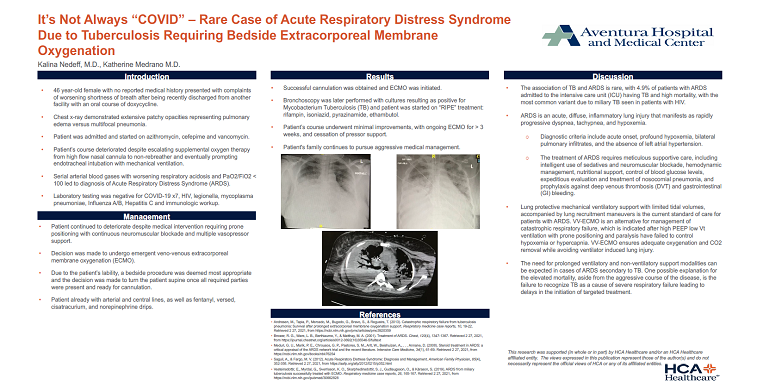2021 FSA Posters
P002: IT'S NOT ALWAYS "COVID" – RARE CASE OF ACUTE RESPIRATORY DISTRESS SYNDROME DUE TO TUBERCULOSIS REQUIRING BEDSIDE EXTRACORPOREAL MEMBRANE OXYGENATION
Kalina Nedeff, MD; Katherine Medrano, MD; Kendall Regional Medical Center
Introduction/Background: 46 year-old female with no reported medical history presented with complaints of worsening shortness of breath after being recently discharged from another facility with an oral course of doxycycline. Chest x-ray demonstrated extensive patchy opacities representing pulmonary edema versus multifocal pneumonia. Patient was admitted and started on azithromycin, cefepime and vancomycin. Patient’s course deteriorated despite escalating supplemental oxygen therapy from high flow nasal cannula to non-rebreather and eventually prompting endotracheal intubation with mechanical ventilation. Serial arterial blood gases with worsening respiratory acidosis and PaO2/FiO2 < 100 led to diagnosis of Acute Respiratory Distress Syndrome (ARDS). Laboratory testing was negative for COVID-19 x7, HIV, legionella, mycoplasma pneumoniae, Influenza A/B, Hepatitis C and immunologic workup.
Methods: Patient continued to deteriorate despite medical intervention requiring prone positioning with continuous neuromuscular blockade and multiple vasopressor support. Decision was made to undergo emergent veno-venous extracorporeal membrane oxygenation (ECMO). Due to the patient’s lability, a bedside procedure was deemed most appropriate and the decision was made to turn the patient supine once all required parties were present and ready for cannulation. Patient already with arterial and central lines, as well as fentanyl, versed, cisatracurium, and norepinephrine drips.
Results: Successful cannulation was obtained and ECMO was initiated. Bronchoscopy was later performed with cultures resulting as positive for Mycobacterium Tuberculosis (TB) and patient was started on “RIPE” treatment: rifampin, isoniazid, pyrazinamide, ethambutol. Patient’s course underwent minimal improvements, with ongoing ECMO for > 3 weeks, and cessation of pressor support. Patient's family continues to pursue aggressive medical management.
Discussion/Conclusion: The association of TB and ARDS is rare, with 4.9% of patients with ARDS admitted to the intensive care unit (ICU) having TB and high mortality, with the most common variant due to miliary TB seen in patients with HIV.
ARDS is an acute, diffuse, inflammatory lung injury that manifests as rapidly progressive dyspnea, tachypnea, and hypoxemia. Diagnostic criteria include acute onset, profound hypoxemia, bilateral pulmonary infiltrates, and the absence of left atrial hypertension. The treatment of ARDS requires meticulous supportive care, including intelligent use of sedatives and neuromuscular blockade, hemodynamic management, nutritional support, control of blood glucose levels, expeditious evaluation and treatment of nosocomial pneumonia, and prophylaxis against deep venous thrombosis (DVT) and gastrointestinal (GI) bleeding.
Lung protective mechanical ventilatory support with limited tidal volumes, accompanied by lung recruitment maneuvers is the current standard of care for patients with ARDS. VV-ECMO is an alternative for management of catastrophic respiratory failure, which is indicated after high PEEP low Vt ventilation with prone positioning and paralysis have failed to control hypoxemia or hypercapnia. VV-ECMO ensures adequate oxygenation and CO2 removal while avoiding ventilator induced lung injury.
The need for prolonged ventilatory and non-ventilatory support modalities can be expected in cases of ARDS secondary to TB. One possible explanation for the elevated mortality, aside from the aggressive course of the disease, is the failure to recognize TB as a cause of severe respiratory failure leading to delays in the initiation of targeted treatment.


